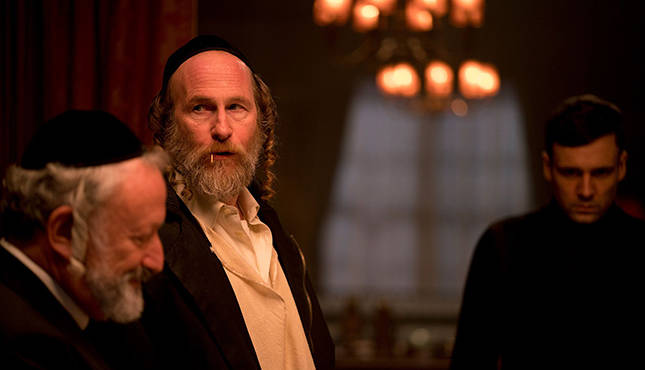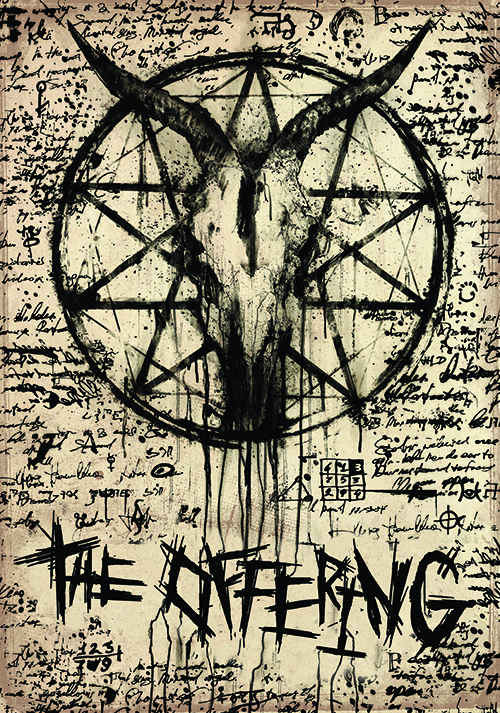Movies & TV / Reviews
Fantastic Fest 2022: The Offering Review
 Image Credit: Decal
Image Credit: Decal
Directed by: Oliver Park
Written by: Hank Hoffman
Starring:
Nick Blood – Art
Emily Wiseman – Claire
Paul Kaye – Heimish
Allan Corduner – Saul
Jonathan Yunger – Levi Siegelman
Boyan Anev – Abyzou
Sofia Weldon – Sarah Scheindal
Yonko Dimitrov – Shmuel

Running Time: 93 minutes
Unrated
Jewish horror is an underrepresented corner of the genre. While horror movies dealing with monsters, demons, and spirits of faith are commonplace, there has historically been a relative dearth coming from Jewish lore. That’s fortunately been changing in recent years as films like The Golem, Demon and The Vigil have begun filling in the gap, but there’s always room for more from the faith’s varied folklore.
The latest to fill said gap is The Offering, which screened at Fantastic Fest 2022. Originally titled Abyzou, Oliver Park’s feature film debut is an unsettling, well-made film that explores grief, faith and generational guilt in the familiar context of a possession story.
The Offering centers on Art (Nick Blood), who returning with his pregnant wife Claire (Emily Wiseman) to the home of his estranged Hasidic father Saul (Allan Corduner). Art and Saul haven’t spoken in years following the passing of Art’s mother, and Saul has never met Claire. This results in a somewhat awkward first encounter, exacerbated by the fact that Saul runs is the undertaker for the local community, with his business located in the lower levels of the home.
While things begin well enough, the situation starts to spiral when the body of a local man who apparently committed suicide is brought in that night. Art begins to help Saul and Saul’s best friend Heimish (Paul Kaye) with the body. But when Heimish takes Saul aside to question the motives of Art’s return, Art makes a simple mistake that provides an opening for the entity that was secretly trapped in the body to peek out. As it turns out, Art does have a secret that complicates matters when the demonic presence puts its attention on Claire, forcing the family to reckon with an ancient evil, ulterior motives, and unresolved family trauma.
It would be inaccurate to say there is much that is incredibly new about what The Offering is presenting as a story. At its core, this is a pretty typical spin on the possession movie complete with a creepy ghost girl, a shadows-cloaked monster, and a touch of human melodrama to add to the tension. It’s the spaces in between those elements where writer Hank Hoffman adds the flavor. The grounding in Hasidic practice adds an element you don’t often see in a Christianity-dominated subgenre, which helps it stand out.
Hoffman also creates a group of characters who, while we may not learn a ton about them, feel like actual characters. There’s conflict without anyone seeming like a cold-hearted villain, and the characters who have distasteful things to be revealed remain sympathetic thanks to some fine character work by the cast and writing that gives nuance to their motivations.
While this is his first time directing a feature-length project, Park has experience as a horror director with shorts such as the well-received Vicious and 2017’s Still. He puts that experience to good use here, building his film around Saul’s home. The space is utilized very well, from the basement morgue to the shadowy, curtain covered ground floor and bedrooms. He mixes the somber atmosphere of wakes with eerie ghostly tricks to great effect, and while there are some jump scares they’re kept to a relative minimum for the hour and a half runtime.
While the escalation of supernatural events is gradual, Park never makes the film feel slow. There are enough dark, amped up moments to keep the audience uncomfortable in their seat until the final act, when everything goes wild. Nothing that occurs here is too surprising, from the late-stage lore dump to the obvious moment where the audience is going to realize a mistake (foreshadowed by some earlier advice) is made. But for the budget, it all remains effective even when the mystery is gone.
Through it all, the film stays on target with its themes. Park takes a nuanced approach to the characters’ faiths; Art may be justified in his bitter views about his father’s devotion, but Saul’s own faith is seen as something that has benefitted him in very real ways. There is a discussion between the lines of the film about how we can pass pain onto the next generation as told both literally in Art and Saul, and metaphorically through the entity itself. The effects work is mostly successful, with the exception of a few full-on shots of the malevolent entity. Add in the distinguishing trappings of the faith and we have a very solid spin on the possession film, even we can figure out the beats in short order.








